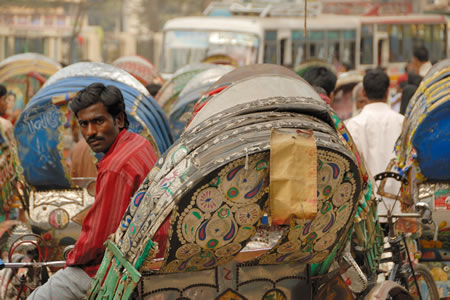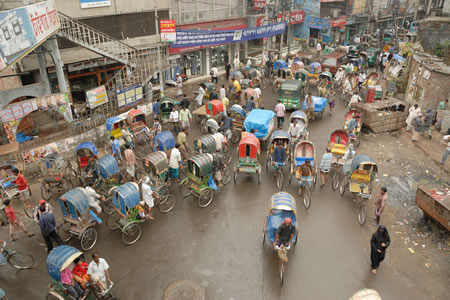

| The battle for a Bangladeshi visa | |
Dhaka (Bangladesh), February 8th 2008 |
|
We are in Agartala, the capital of the Indian state Tripura. After visiting North-eastern India, we want to visit Bangladesh. Therefore, we travelled all the way to Agartala to arrange our Bangladeshi visa at the visa office of Bangladesh. Monday morning at 8:45 a.m., we are standing before the closed doors of the office. The visa office officially opens at 9:00 a.m., but it is only just operational at 9:30. We have been informed by several sources that obtaining a Bangladeshi visa would be easy, but our first impression isn’t that optimistic. |
|
 |
|
A bicycle rickshaw driver in central Dhaka |
|
Just after 9:30 a.m. we are called by an employee of the consul. It appears to be the person who coordinates all applications and he doesn’t have a good first impression. This is typically the kind of guy that you dislike immediately. This guy feels that he is in power and that is exactly the way he behaves. He doesn’t communicate in a normal way. Instead he growls his commands at us like: “Passports!”, “Passport pictures!” and “Sit there!”. He grates on our nerves, but we stay calm and friendly. Getting involved in an argument with this man won’t help us getting our visa. When he snarls for how many days we need a visa, we answer six weeks. After all, our flight from Dhaka to Bangkok leaves half March and at this moment it is at the beginning of February. The employee, that we have nicknamed “creepy jerk”, growls that we will get a visa for 15 days at the most and this visa will be non-extendable. The first drops of sweat start to appear on our foreheads. If this is true, we will have a problem as our flight from Dhaka to Bangkok is non refundable. We notify “creepy jerk” that we have spoken with the consul telephonically last week and he said that we should stop by. Then he would see what he could do. We cherish our hopes on the consul who will interview us later this morning. Apparently it is normal that people who apply for a visa in Agartala are questioned by the consul. Our not so good relationship with “creepy jerk” is challenged even more when he snarls “ID-card!”. We only have a passport and that doesn’t satisfy him. With ID-card he means an official document that states that we are economists and –more importantly- no journalists. When we try to explain that these kinds of documents aren’t used in The Netherlands he shakes his head. As he walks back to his office he growls that we should not expect to get a visa, but that his “boss” (consul) must decide. At this moment, the drops of sweat aren’t only on our forehead but also our shirts are soaking wet under our armpits. The only thing that we can do is hoping for the reasonableness and sympathy of the consul. Ten minutes later, the consul is ready to speak to us. We take our seats on the chairs in front of his desk, while our passports and application forms are already on his bureau. He looks at the application form and asks for how long we would like to get a visa. “Six weeks” we answer. He looks flabbergasted and asks us why on earth we want to be in Bangladesh for six weeks. “Bangladesh seems to be a beautiful country that we would like to see well” is our answer. To further motivate our request we add “this may be the only time that we are able to come to Bangladesh”. “We only give visas for 15 days” is his short answer. A bit emotional we remind him that we have spoken with him last week on the phone and that he told us to stop by, so he could see what he could do for us. After a moment of silence he asks what our profession is. “Economists” is our short and honest reply. To be on the safe side he asks explicitly whether we are journalists. With a smile we answer “No, we are not journalists”. We are glad that we don’t have that profession as it appears to be much more difficult to get a visa. For some reason, journalists aren’t welcomed with open arms to spend a holiday in Bangladesh. As the consul seems not convinced he asks whether we can proof that we are economists. “No”, we answer simultaneously, “we don’t have any kind of ID-card that proofs our profession”. With an austere voice he tells us that we should hand over enough documents to enable them to verify that we tell the truth. He adds: “When Bangladeshis want to visit your country, we also have to hand over piles of documents!”. Here he has a point. But on the other hand it is very strange that people who arrive by aeroplane on the airport of Dhaka are allowed to stay in Bangladesh without all this fuss. No documents, no hassle, just paying the fee is enough. |
|
 |
|
Traffic jam in central Dhaka |
|
Slowly but steadily we feel that our chances of getting a Bangladeshi visa are shrinking. At the moment that we start thinking “go to hell” he says: “OK, I will give you a visa for four weeks”. This is an unexpected and good turn of the conversation but it isn’t enough. We need six weeks because of our non-refundable flight ticket. We take our flight tickets out of our bag and while we look as sad as possible we say: “But our flight leaves half March, we really need six weeks”. He takes his pen and scrawls 45 on our application forms. “OK, you will get 45 days” he says. “My employee (he means “creepy jerk”) will make the visas ready”. Triumphantly, we leave the office of the consul to head straight to the desk of “creepy jerk”. When we tell him that we have got the approval for a 45-days visa, he is stunned. All at once, he starts to smile in a fawning way and soon we come to know why. He whispers “Money for me, pleeeease”, while he makes the money sign by rubbing with his right forefinger over his right thumb. He tries to take advantage of the success that we just achieved by asking for a bribe. However, if there is one person that wasn’t useful in the process it is “creepy jerk”. In the last few hours he was so irritating and annoying that we would prefer to slam him in the face. But this is still not the time for getting involved in an argument with him, because he needs to put the visa stamps inside our passports. Our reply on his request for a bribe is short: “Visa”. This may give him the impression that he will receive a bribe after delivering the visa, but we know that this is not going to happen. The consul has given his approval and we have the impression that “creepy jerk” is undertaking his bribe business without his boss’s knowledge. Then “creepy jerk” says that we have to deposit our visa fee on the bank account of the visa office. This has to be done at the State Bank of India at the other side of the city. And so it happens. Just over an hour later, we are back at his desk with the voucher of the deposit. He leans forward and again he murmurs “money for me, pleeeease”. Our answer stays the same: “Visa”. He puts the stamps in our passports and asks us to take a seat in the waiting room. Apparently, the consul still has to put his signature on the visa. Half an hour later, “creepy jerk” enters the waiting room and closes the door behind him. He sits down on the couch next to Edwin and hands over the passports. Again he murmurs to get money. With our passports and the visas safely in our hands, we stand up and walk away. Behind us we hear “You are bad people, very bad people! Look at yourself! © copyright - Babakoto.eu / 2008 |
|